- Home
- Ken Follett
Storm Island Page 2
Storm Island Read online
Page 2
She giggled again, thinking: I'm a disgrace. 20She took her drink
to bed and picked up her book, but it was too much effort to focus on
die print. Besides, she was bored with vicarious romance. Stories
about dangerous love affairs were fine when you yourself had a
perfectly safe love affair with your husband, but a woman needed more
than Barbara Caitland. She sipped her gin, and wished Mr. Faber would
turn the radio off. It was like trying to sleep at a tea-dance !
She could, of course, ask him to turn it off. She looked at her
bedside clock: it was past ten. She could put on her dressing-gown,
which matched the nightdress, and just comb her hair a little, then
step into her slippers quite dainty, with a pattern of roses and just
pop up the stairs to the next landing, and just, well, tap on his door.
He would open it, perhaps wearing his trousers and singlet, and then he
would look at her the way he had looked when he saw her in her
nightdress on the way to the bathroom... "Silly old fool," she said to
herself aloud.
"You're just making excuses to go up there."
And then she wondered why she needed excuses. She was a mature adult,
and it was her house, and in ten years she had not met another man who
was just right for her, and what the hell, she needed to feel someone
strong and hard and hairy on top of her, squeezing her breasts and
panting in her ear and parting her thighs with his broad flat hands,
for tomorrow the gas bombs might come over from Germany and they would
all die choking and gasping and poisoned and she would have lost her
last chance.
So she drained her glass, and got out of bed, and put on her
dressing-gown, and just combed her hair a little, and stepped into her
slippers, and picked up her bunch of keys in case he had locked the
door and couldn't hear her knock above the sound of the radio.
There was nobody on the landing. She found the stairs in the darkness.
She intended to step over the stair that creaked, but she stumbled on
the loose carpet and trod on it heavily; but it seemed that nobody
heard, so she went on up and tapped on the door at the top. She tried
it gently. It was locked.
The radio was turned down, and Mr. Faber called out: Yes?"
He was well-spoken: not cockney, or foreign not anything, really, just
a pleasantly neutral voice.
She said: "Can I have a word with you?"
He seemed to hesitate, then he said: "I'm undressed."
"So am I," she giggled, and she opened the door with her duplicate key.
He was standing in front of the radio with some kind of screwdriver in
his hand. He wore his trousers and no singlet. His face was white and
he looked scared to death.
She stepped inside and closed the door behind her, not knowing what to
say. Suddenly she remembered a line from an American film, and she
said: Would you buy a lonely girl a drink?" It was silly, really,
because she knew he had no drink in his room, and she certainly wasn't
dressed to go out; but it sounded vampish.
It seemed to have the desired effect. Without speaking, he came slowly
toward her. He did have hair on his nipples. She took a step forward,
and then his arms went around her, and she closed her eyes and turned
up her face, and he kissed her, and she moved slightly in his arms, and
then there was a terrible, awful, unbearable sharp pain in her back and
she opened her mouth to scream.
He had heard her stumble on the stairs. If she'd waited another minute
he would have had the radio transmitter back in its case and the code
books in the drawer and there would have been no need for her to die.
But before he could conceal the evidence he had heard her key in the
lock, and when she opened the door the stiletto had been in his hand.
Because she moved slightly in his arms, Faber missed her heart with the
first jab of the weapon, and he had to thrust his fingers down her
throat to stop her crying out. He jabbed again, but she moved again
and the blade struck a rib and merely slashed her superficially. Then
the blood was spurting and he knew it would not be a clean kill, it
never was when you missed with the first stroke.
She was wriggling too much to be killed with a jab now. Keeping his
fingers in her mouth, he gripped her jaw with his thumb and pushed her
back against the door. Her head hit the woodwork with a loud bump, and
he wished he had not turned the radio down, but how could he have
expected this?
He hesitated before killing her, because it would be much better if she
died on the bed better for the cover-up which was already taking shape
in his mind but he could not be sure of getting her that far in
silence. He tightened his hold on her jaw, kept her head still by
jamming it against the door, and brought the stiletto around in a wide
slashing arc that ripped away most of her throat, for the stiletto was
not a slashing knife and the throat was not Faber's favoured target.
He jumped back to avoid the first horrible gush of blood, then stepped
forward again to catch her before she hit the floor. He dragged her to
the bed, trying not to look at her neck, and laid her down.
He had killed before, so he expected the reaction: it always came as
soon as he felt safe. He went over to the sink in the corner of the
room and waited for it. He could see his face in the little shaving
mirror. He was white, and his eyes were staring. He looked at himself
and thought: Killer. Then he threw up.
When that was over he felt better. He could go to work now. He knew
what he had to do: the details had come to him even while he was
killing her.
He washed his face, brushed his teeth, and cleaned the washbasin. Then
he sat down at the table beside his radio. He looked at his notebook,
found his place, and began tapping the key. It was a long message,
about the mustering of an army for Finland, and he had been half way
through when he was interrupted. It was written down in cipher on the
pad. When he had completed it he signed off with: "Regards to
Willi."
The transmitter packed away neatly into a specially designed suitcase.
Faber put the rest of his possessions into a second case. He took off
his trousers and sponged the bloodstains, then washed himself all
over.
At last he looked at the corpse.
He was able to be cold about her now. It was wartime; they were
enemies: if he had not killed her, she would have caused his death. She
had been a threat, and all he felt now was relief that the threat had
been nullified. She should not have frightened him.
Nevertheless, his last task was distasteful. He opened her robe and
lifted her nightdress, pulling it up around her waist. She was wearing
knickers. He tore them, so that the hair of her pubis was visible.
Poor woman: she had wanted only to seduce him. But he could not have
got her out of the room without her seeing the transmitter; and the
British progapanda had made these people alert for spies ridiculously
so: if the Abwehr had as many a
gents as the newspapers made out then
the British would have lost the war already.
He stepped back and looked at her with his head on one side. There was
something wrong. He tried to think like a sex maniac. If I were
crazed with lust for a woman like Una Garden, and I killed her just so
that I could have my way with her, what would I then do?
Of course: that kind of lunatic would want to look at her breasts.
Faber leaned over the body, gripped the neckline of the nightdress, and
ripped it to the waist. Her large breasts sagged sideways.
The police doctor would soon discover that she had not been raped, but
Faber did not think that mattered. He had taken a criminology course
at Heidelberg, and he knew that many sexual assaults were not
consummated. Besides, he could not have carried the deception that
far, not even for the Fatherland. He was not in the SS. Some of them
would queue up to rape the corpse... He put the thought out of his
mind.
He washed his hands again and got dressed. It was almost midnight. He
would wait an hour before leaving: it would be safer later.
He sat down to think about how he had gone wrong.
There was no question that he had made a mistake. If his cover were
perfect, he would be totally secure. If he were totally secure no one
could discover his secret. Mrs. Garden had discovered his secret or
rather, she would have if she had lived a few seconds longer therefore
he had not been totally secure, therefore his cover was not perfect,
therefore he had made a mistake.
He should have put a bolt on the door. Better to be thought
chronically shy than to have landladies with duplicate keys sneaking in
at night in their bed wear
That was the surface error. The deep flaw was that he was too eligible
to be a bachelor. He thought this with irritation, not conceit. He
knew that he was a pleasant, attractive man, and that there was no
apparent reason why he should be single. He turned his mind to
thinking up a cover that would explain this without inviting advances
from the Mrs. Gardens of this world.
He ought io be able to find inspiration in his real personality. Why
was he single? He stirred uneasily: he did not like mirrors. The
answer was simple. He was single because of his profession. If there
were deeper reasons, he did not want to know them.
He would have to spend tonight in the open.-Highgate Wood would do. In
the morning he would take his suitcases to a railway station
left-luggage office, then tomorrow evening he would go to his room in
Blackheath.
He would shift to his second identity. He had little fear of being
caught by the police. The commercial traveller who occupied the room
at Blackheath on weekends looked rather different from the railway
clerk who had killed his landlady. The Blackheath persona was
expansive, vulgar and flashy. He wore loud ties, bought rounds of
drinks, and combed his hair differently. The police would circulate a
description of a shabby little pervert who would not say boo to a goose
until he was inflamed with lust, and no one would look twice at the
handsome salesman in the striped suit who was obviously the type that
was more or less permanently inflamed with lust and did not have to
kill women to get them to show him their breasts.
He would have to set up another identity he always kept at least two.
He needed a new job, fresh papers passport, identity card, ration book,
birth certificate. It was all so risky. Damn Mrs. Garden. Why
couldn't she have drunk herself to sleep as usual?
It was one o'clock. Faber took a last look around the room. He was
not concerned about leaving clues his fingerprints were obviously all
over the house, and there would be no doubt in anyone's mind about who
was the murderer. Nor did he feel any sentiment about leaving the
place that had been his home for two years: he had never thought of it
as home. He had never thought of anywhere as home.
He would always think of this as the place where he had learned to put
a bolt on a door.
He turned out the light, picked up his cases, and crept down the stairs
and out of the door into the night.
TWO
Henry II was a remarkable king. In an age when the term 'flying visit'
had not yet been coined, he flitted between England and France with
such rapidity that he was credited with magical powers; a rumour which,
understandably, he did nothing to suppress. In 1173 either the June or
the September, depending upon which secondary source one favours he
arrived in England and left for France again so quickly that no
contemporary writer ever found out about it. Later historians
discovered the record of his expenditure in the Pipe Rolls. At the
time his kingdom was under attack by his sons at its northern and
southern extremes the Scottish border and the South of France. But
what, precisely, was the purpose of his visit? Whom did he see? Why
was it secret, when the myth of his magical speed was worth an army?
What did he accomplish?
This was the problem that taxed Percival Godliman in the summer of
1940, when Hitler's armies swept across the French cornfields like a
scythe, and the British poured out of the Dunkirk bottleneck in bloody
disarray.
Professor Godliman knew more about the Middle Ages than any man alive.
His book on the Black Death had upended every convention of
medievalism; it had also been a bestseller and published as a Penguin.
With that behind him he had turned to a slightly earlier and ever more
intractable period.
At 12.30 on a splendid June day in London, a secretary found Godliman
hunched over an illuminated manuscript, laboriously translating its
medieval Latin, making notes in his own even less legible handwriting.
The secretary, who was planning to eat her lunch in the garden of
Gordon Square, did not like the manuscript room because it smelled
dead. You needed so many keys to get in there, it might as well have
been a tomb.
Godliman stood at a lectern, perched on one leg like a bird, his face
lit bleakly by a spotlight above: he might have been the ghost of the
monk who wrote the book, standing a cold vigil over his precious
chronicle. The girl cleared her throat and waited for him to notice
her. She saw a short man in his fifties, with round shoulders and weak
eyesight, wearing a tweed suit. She knew he could be perfectly
sensible once you dragged him out of the Middle Ages. She coughed
again and said: "Professor Godliman ?"
He looked up, and when he saw her he smiled, and then he did not look
like a ghost, more like someone's dotty father.
"Hello!" he said, in an astonished tone, as if he had just met his
next-door neighbour in the middle of the Sahara Desert.
"You asked me to remind you that you have lunch at the Savoy with
Colonel Terry."
"Oh, yes." He took his watch out of his waistcoat pocket and peered at
it.
"If I'm going to walk it, I'd better leave now."
She nod
ded.
"I brought your gas mask."
"You are thoughtful!" He smiled again, and she decided he looked quite
nice. He took the mask from her and said : "Do I need my coat?"
"You didn't wear one this morning. It's quite warm. Shall I lock up
after you?"
"Thank you, thank you." He jammed his notebook into his jacket pocket
and went out.
The secretary looked around, shivered, and followed him.
Colonel Andrew Terry was a red-faced Scot, pauper-thin from a lifetime
of heavy smoking, with sparse dark-blond hair thickly brilliantined.
Godliman found him at a corner table in the Savoy Grill, wearing
civilian clothes. There were three cigarette stubs in the ashtray. He
stood up to shake hands.
Godliman said: "Morning, Uncle Andrew," Terry was his mother's baby
brother.
"How are you, Percy?"
"I'm writing a book about the Plantagenets." Godliman sat down.
"Are your manuscripts still in London? I'm surprised."
Why?"
Terry lit another cigarette.
"Move them to the country in case of bombing."
"Should I?"
"Half the National Gallery has been shoved into a bloody big hole in
the ground somewhere up in Wales. Young Kenneth Clark is quicker off
the mark than you. Might be sensible to take yourself off out of it
too, while you're about it. I don't suppose you've many students
left."
"That's true." Godliman took a menu from a waiter and said: "I don't

 The Pillars of the Earth
The Pillars of the Earth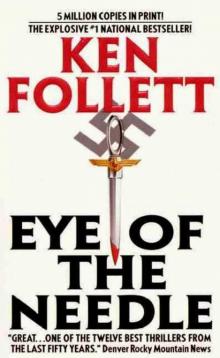 Eye Of The Needle
Eye Of The Needle Lie Down With Lions
Lie Down With Lions Winter of the World
Winter of the World Triple
Triple World Without End
World Without End Fall of Giants
Fall of Giants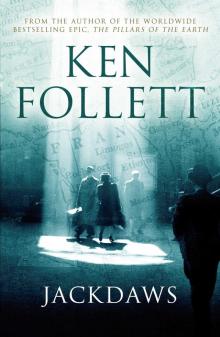 Jackdaws
Jackdaws Hornet Flight
Hornet Flight Whiteout
Whiteout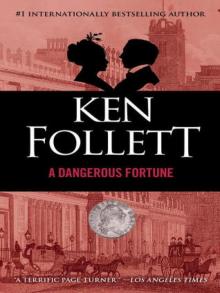 A Dangerous Fortune
A Dangerous Fortune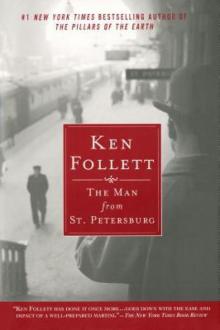 The Man From St. Petersburg
The Man From St. Petersburg A Column of Fire
A Column of Fire The Hammer of Eden
The Hammer of Eden On Wings of Eagles
On Wings of Eagles The Evening and the Morning
The Evening and the Morning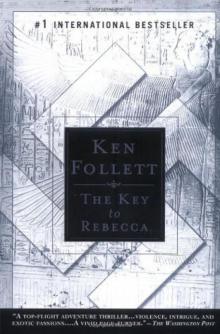 The Key to Rebecca
The Key to Rebecca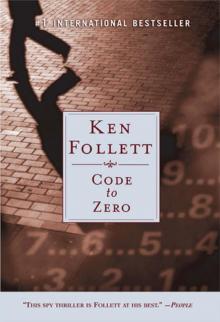 Code to Zero
Code to Zero Paper Money
Paper Money A Place Called Freedom
A Place Called Freedom The Modigliani Scandal
The Modigliani Scandal Triple (1991)
Triple (1991) A Dangerous Fortune (1994)
A Dangerous Fortune (1994) A Place Called Freedom (1995)
A Place Called Freedom (1995) Winter of the World (Century Trilogy 2)
Winter of the World (Century Trilogy 2) Code to Zero (2000)
Code to Zero (2000) On Wings Of Eagles (1990)
On Wings Of Eagles (1990) Storm Island
Storm Island Fall of Giants (The Century Trilogy)
Fall of Giants (The Century Trilogy) the Third Twin (1996)
the Third Twin (1996)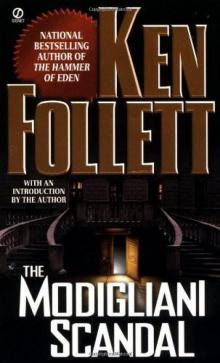 The Modigliani Scandal (1976)
The Modigliani Scandal (1976) Night Over Water
Night Over Water